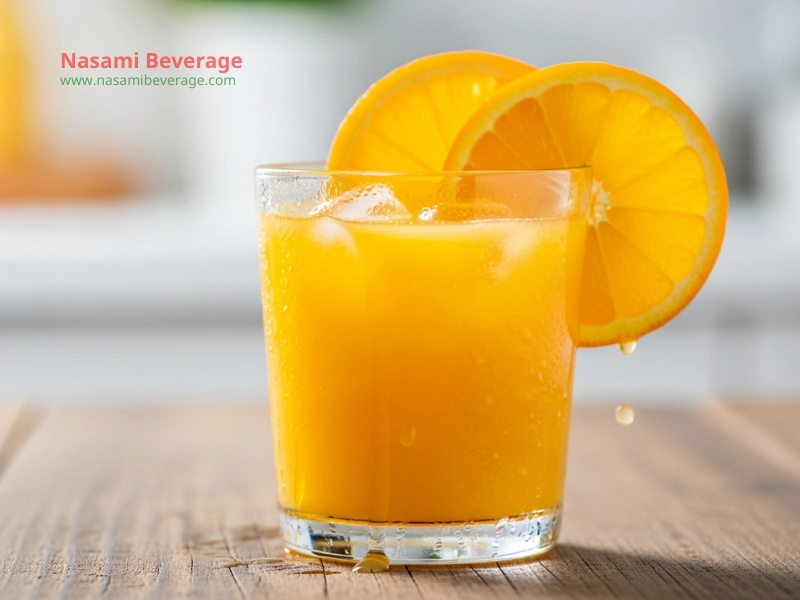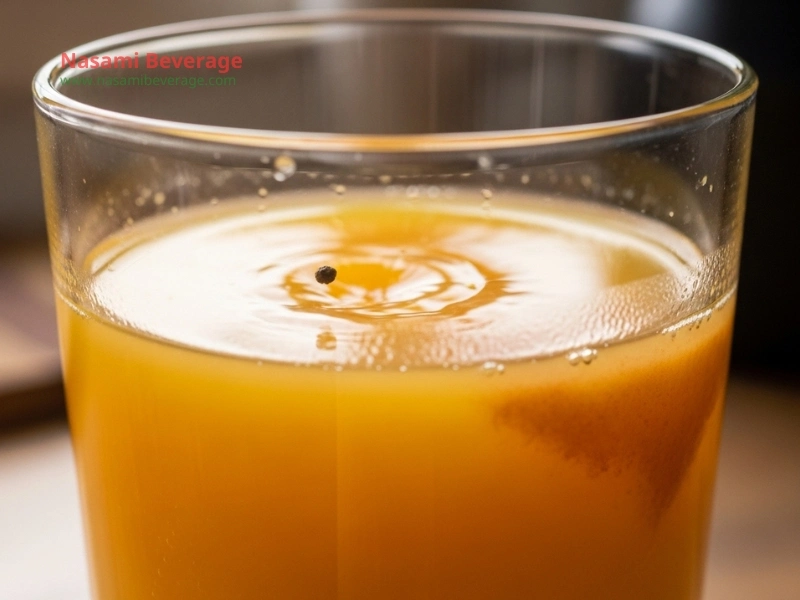For many, a tall glass of orange juice is a symbol of a healthy breakfast. But if you have diabetes, you know that even “healthy” foods can be complex. When it comes to managing blood sugar, the question, is orange juice good for diabetics?, is critical. This comprehensive guide from the team at Nasami Beverage will explore the nuances of drinking orange juice with diabetes.
We’ll break down the nutritional differences between whole oranges and orange juice, analyze its impact on blood glucose, discuss potential risks like acid reflux, and uncover why it might taste strange after brushing your teeth, all while presenting healthier alternatives.
The Short Answer – Why It’s Complicated for Diabetics
The simple answer is that for daily consumption, orange juice is generally not a recommended choice for individuals with diabetes. While some orange juice benefits exist, such as high Vitamin C content, the risks often outweigh them.
The primary issue lies in its high concentration of sugar and lack of dietary fiber, a combination that can lead to rapid and significant spikes in blood sugar levels.
While it’s a staple in many households, people with diabetes must approach orange juice with extreme caution.
The Nutritional Breakdown – Whole Orange vs. Orange Juice
Understanding the difference between eating an orange and drinking its juice is the key to making an informed decision. The transformation from fruit to juice fundamentally alters its nutritional profile and how your body processes it.
The Fiber Factor – The Missing Piece in Juice
One of the most significant differences between a whole orange and orange juice is the fiber content. A medium-sized orange contains a good amount of fiber, while an 8-ounce glass of orange juice has very little, if any.
This is critical because dietary fiber slows down the digestion and absorption of sugar into the bloodstream, resulting in a more gradual and manageable rise in blood glucose. When you drink juice, you’re consuming the fruit’s sugar without this natural “brake,” leading to a much faster sugar rush.
A Concentrated Dose of Sugar
It takes multiple oranges to produce a single glass of juice, meaning you consume the sugar from all those oranges in one sitting. An 8-ounce glass of unsweetened orange juice contains around 26 grams of carbohydrates and can have nearly double the calories of a single orange.
While this sugar is natural fructose, its concentration and the absence of fiber mean your body absorbs it almost as quickly as it would processed sugar, presenting a significant challenge for blood sugar control.
Understanding the Glycemic Index of Orange Juice
The Glycemic Index (GI) is a scale from 0 to 100 that ranks foods based on how quickly they raise blood sugar levels. Foods with a high GI are digested and absorbed rapidly, causing a sharp glucose spike.
Orange juice has a moderate to high GI, with values typically ranging from 50 to as high as 76, depending on the type and processing.
For comparison, a whole orange has a much lower GI of around 43. This difference is almost entirely due to the lack of fiber in juice. Consuming orange juice, especially on its own, can cause a quick and significant increase in blood sugar, which is precisely what people with diabetes aim to avoid.
Are There Any Benefits? The Role of Orange Juice in Hypoglycemia
There is one specific scenario where orange juice is not only acceptable but recommended: treating hypoglycemia. Hypoglycemia is a condition characterized by dangerously low blood sugar. Its symptoms can include shakiness, sweating, confusion, and a rapid heartbeat.
In these cases, a quick source of sugar is needed to bring blood glucose back to a safe level. The American Diabetes Association often recommends the “15-15 rule”: consume 15 grams of fast-acting carbohydrates and re-check your blood sugar in 15 minutes. A 4-ounce (120 ml) serving of orange juice fits this requirement perfectly. Here, its ability to rapidly raise blood sugar is an asset. However, it’s crucial to see this as a specific medical treatment, not a justification for daily drinking.
Navigating the Supermarket Aisle – Reading Juice Labels
The juice aisle can be confusing, with labels that can be misleading. Here’s what to look out for:
“100% Juice” vs. “From Concentrate”: “100% juice” means the product is made entirely from fruit juice, but it doesn’t mean it’s low in sugar. Both freshly squeezed and from-concentrate versions will have a high natural sugar content.
The “No Added Sugar” Trap: This label simply means the manufacturer hasn’t added extra sugar, like high-fructose corn syrup. However, the juice itself is still packed with the fruit’s natural sugars, which will impact your glucose levels.
What About “Light” or “Low Sugar” Options?: Brands like Tropicana offer “Light” or “Trop50” versions with reduced sugar and calories. These are often made by adding water and artificial sweeteners. While they have fewer carbs, they are also less natural and don’t offer the same nutritional profile as whole fruit.
“The doctor of the future will give no medicine, but will interest his patients in the care of the human frame, in diet, and in the cause and prevention of disease.” – Thomas Edison
Other Considerations – Acid Reflux and That Funny Taste
Beyond blood sugar, there are other factors to consider. The natural acid in oranges, primarily citric acid, can be problematic for some.
Is orange juice bad for acid reflux? For many people, yes. The high acidity of citrus juices can relax the sphincter at the top of the stomach, allowing stomach acid to splash back into the esophagus, causing the burning sensation of heartburn and worsening symptoms of GERD (Gastroesophageal Reflux Disease).
And have you ever wondered why does orange juice taste bad after brushing teeth? The culprit is a foaming agent in most toothpastes called Sodium Lauryl Sulfate (SLS). SLS does two things: it suppresses your tongue’s sweet receptors and breaks down fatty molecules that normally block your bitter receptors. This combination dulls the sweetness of the juice and amplifies its bitterness, creating that well-known unpleasant taste.
Finally, what about bad orange juice? This can refer to juice that has spoiled, which should obviously be avoided. But in the context of diabetes, even fresh orange juice can be a “bad” choice for regular consumption due to its blood sugar effects.
5 Safer and Healthier Drink Alternatives for Diabetics
Instead of orange juice, consider these hydrating and blood-sugar-friendly options:
Water: The undisputed champion of hydration. It’s calorie-free, sugar-free, and essential for overall health.
Infused Water: Add slices of orange, lemon, cucumber, or mint to water for a hint of flavor without any sugar.
Unsweetened Tea: Green, black, or herbal teas are excellent choices, packed with antioxidants and virtually carb-free.
Low-Carb Vegetable Juice: A fresh juice made from celery, cucumber, spinach, and a few berries can provide nutrients with minimal impact on blood sugar.
Tomato Juice: Unsweetened tomato juice is lower in sugar than most fruit juices and offers its own set of nutrients.
The Verdict – Should Diabetics Drink Orange Juice?
While a small amount of orange juice can be a useful tool for treating low blood sugar, it is not a recommended beverage for daily consumption if you have diabetes. The high sugar content, lack of fiber, and significant impact on blood glucose levels make it a risky choice for stable diabetes management.
The best practice is always to choose the whole fruit over the juice. Eating a whole orange provides valuable fiber, is more filling, and leads to a much gentler blood sugar response.
Frequently Asked Questions (FAQ)
Is fresh-squeezed orange juice any better for diabetics?
While it’s less processed, fresh-squeezed orange juice still contains all the natural sugar without the fiber. Its effect on blood sugar is very similar to store-bought 100% juice, so the same caution applies.
Can orange juice help with my vitamin C intake if I have diabetes?
Yes, it is high in Vitamin C, but you can get this essential nutrient from many other low-sugar sources. Whole oranges, strawberries, bell peppers, and broccoli are all excellent choices that won’t spike your blood sugar.
How much orange juice is safe for a diabetic to drink?
For regular dietary purposes, it’s best to avoid it or limit it to a very small portion (e.g., 2-4 ounces) consumed with a meal containing protein and healthy fats to buffer the sugar absorption. For treating hypoglycemia, 4 ounces is the standard recommendation, but you should always follow your doctor’s specific advice.
Will drinking orange juice cause me to develop type 2 diabetes?
Some research suggests that regular, high consumption of fruit juices is associated with an increased risk of developing type 2 diabetes. This is likely due to the high sugar load, which can contribute to weight gain and insulin resistance over time.
This article was researched and compiled by the Nasami Beverage team to provide clear, actionable information on the topic of is orange juice good for diabetics.
Our goal is to empower individuals with the knowledge to make healthier choices. For managing diabetes, prioritizing whole foods over processed juices is a cornerstone of a healthy diet, and understanding the impact of beverages like orange juice is essential for optimal blood sugar control.


